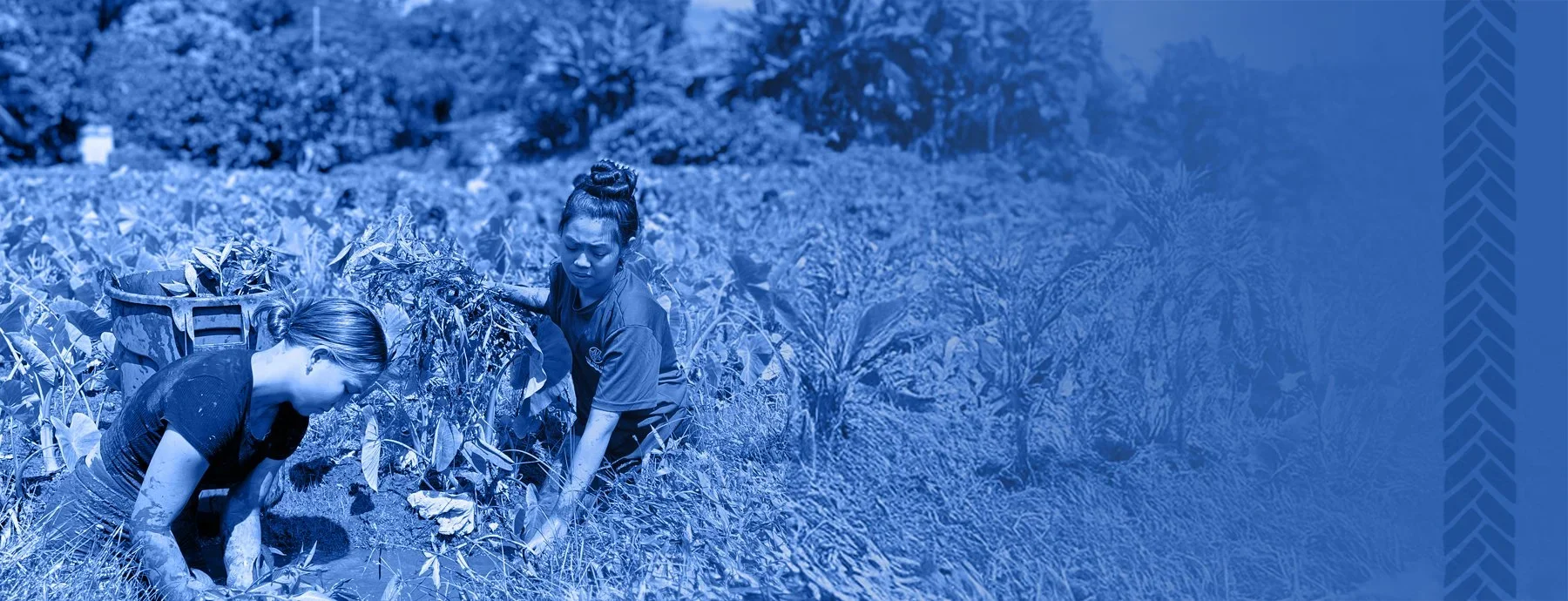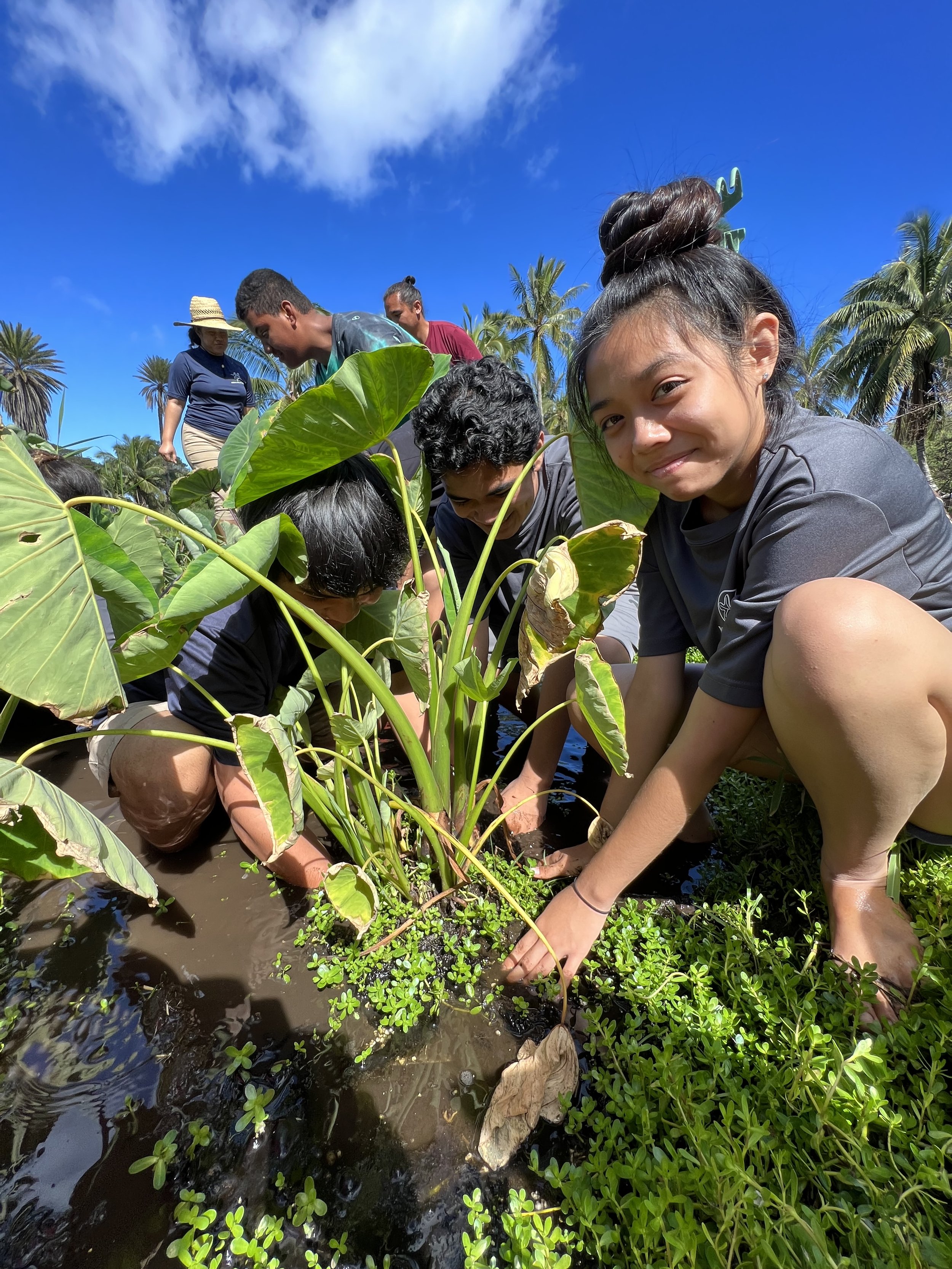Kū ʻAʻaliʻi
Overview
The Kū ʻAʻaliʻi program has been operating in conjunction with the Mahope o Ke Kula Aʻo Mau Ana Program since September 2021. It aims to inspire students from Native Hawaiian communities to achieve socio-economic success. This is achieved by fostering resilience through culture-based, trauma-informed care education and immersive experiences in Hawaiian culture values and practices. These impactful activities take place during regular class hours, after-school sessions, as well as intercession breaks, providing hands-on learning opportunities.
Peer Mentors
Culture-Based
Trauma-Informed
Value-Driven
Youth-mentoring opportunities are offered by engaging high school students to lead, support, and encourage middle school students through a trauma-informed lens. The high school Peer Mentors actively participate in all Kū ʻAʻaliʻi activities and events, along with receiving ongoing professional development and trauma-informed care training. Together with partnered school administrators, Mālama ʻĀina Foundation selects dedicated high schoolers to mentor and make a positive impact on their younger peers, ensuring a high-quality mentoring experience rooted in the foundation’s values and mission.
Waianae
At our bi-annual ‘Ohana Nights, Peer Mentors lead presentations and serve as MCs, showcasing the work of Mahope participants and bringing families and the community together.
Kohala
Having traveled from Kohala to Hilo, our Peer Mentor and Mahope program enjoy a day at Panaewa Zoo to observe animals recently studied in their Holoholona Hawaiʻi curriculum unit.
Hilo
During our summer program in Hilo, our Peer Mentors assist students with the art of kilo, making observations of what is growing in our food boxes. Learning about food sustainability fosters community resilience and empowers youth to grow their own food.
Nohona Hawaiʻi
Laulima
ʻAohe hana nui ke alu ʻia.
No task is too big when done together by all.
ʻŌlelo Noʻeau 142
—————————————————
Laulima (“many hands”) is a crucial value because our work involves many hands coming together. When many hands work, many hands learn. I think of the times we get to work in different loʻi. There is plenty of work to be done and plenty of learning to be gained. By working together to clear the weeds, we put our core value of Laulima into practice.
- Angel
Kauhaʻa
Komo mai kau māpuna hoe.
Put in your dip of the paddle.
ʻŌlelo Noʻeau 1836
_________________________
Kauhaʻa means everyone has a part in something. Each of us has a role and we act out those roles according to our different responsibilities. As Kū ʻAʻaliʻi Peer Mentors, we practice kauhaʻa by doing our part to provide a safe learning environment for our Mahope o Ke Kula Ke Aʻo Mau Ana haumāna and to encourage them. Just like us Kū ʻAʻaliʻi Peer Mentors, each student has a part in the program as well. By embracing kauhaʻa, we demonstrate our willingness to dip our paddle in, show up with humility and work together towards the success of our programs.
- Kayla
Kūpono
________________________________
Kūpono can be broken up into two parts: Kū, meaning to stand upright, and pono, meaning excellence and/or equity. Kūpono is to stand with excellence and equity. As high school Kū ʻAʻaʻliʻi Peer Mentors working with the middle schoolers of the Mahope program, we must embody kūpono by standing with excellence as leaders of the program. We strive to set good examples for the students. As leaders, we also put our hands to work in the ‘āina alongside the students, hoping they see us as role models who guide and collaborate with them. Through this, we hope the students will learn that hard work is done efficiently with a good leader.
- Jheyden
ʻIke
____________________________
ʻIke, which means knowledge or to know, is one of our core values at Mālama ʻĀina Foundation. Just as the middle school students in the Mahope program earn and gain knowledge through different learning opportunities, so do the high school Kū ʻAʻaliʻi Peer Mentors. As peer mentors, we assist in the studentsʻ learning and strive to understand what is happening with the students both in and out of the program. Our ongoing professional development opportunities and trauma-informed care (TIC) trainings help us to achieve this level of knowledge and insight. We do our best to support and take care of each student by showing empathy and gaining an understanding of whatever they may be going through.
- Kenneth
Mālama
________________________________
Mālama is the act of taking care of something. Whether itʻs taking care of yourself, your family members, your belongings or our ʻāina itself. I demonstrate mālama everyday to set a good example for the younger students I work with. This includes a range from keeping our areas clean to ensuring the well-being of the students. By demonstrating mālama as a Kū ʻAʻaliʻi Peer Mentor, I hope to encourage the middle schoolers to show the same care to things, people and places around them.
- Keao















